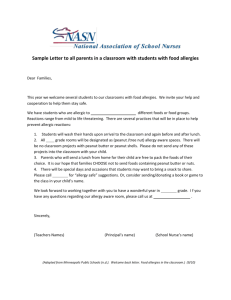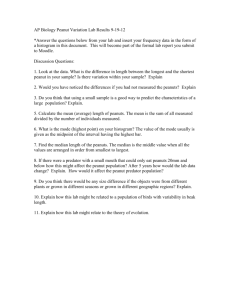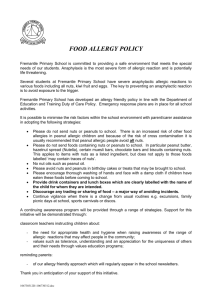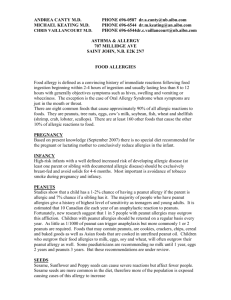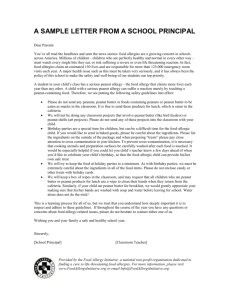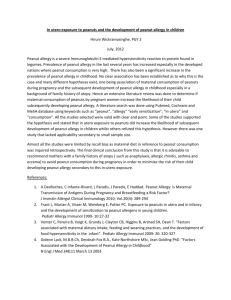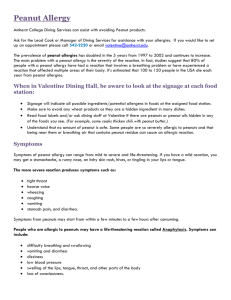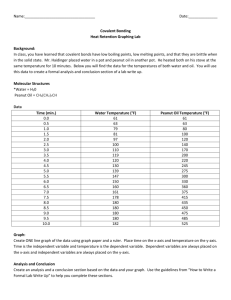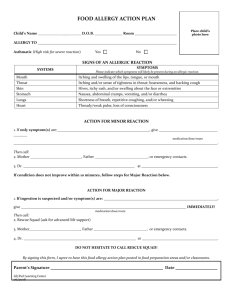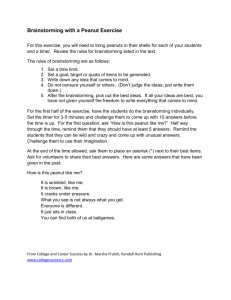Peanut Allergy Patient Leaflet
advertisement
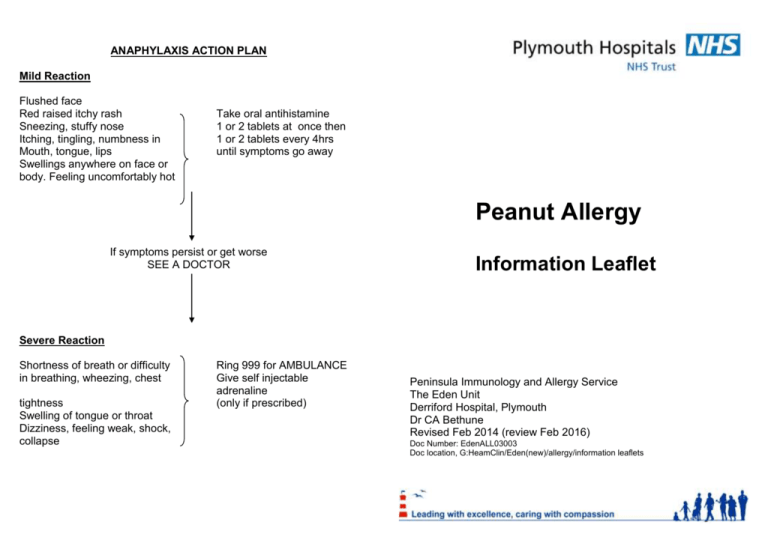
ANAPHYLAXIS ACTION PLAN Mild Reaction Flushed face Red raised itchy rash Sneezing, stuffy nose Itching, tingling, numbness in Mouth, tongue, lips Swellings anywhere on face or body. Feeling uncomfortably hot Take oral antihistamine 1 or 2 tablets at once then 1 or 2 tablets every 4hrs until symptoms go away Peanut Allergy If symptoms persist or get worse SEE A DOCTOR Information Leaflet Severe Reaction Shortness of breath or difficulty in breathing, wheezing, chest tightness Swelling of tongue or throat Dizziness, feeling weak, shock, collapse Ring 999 for AMBULANCE Give self injectable adrenaline (only if prescribed) Peninsula Immunology and Allergy Service The Eden Unit Derriford Hospital, Plymouth Dr CA Bethune Revised Feb 2014 (review Feb 2016) Doc Number: EdenALL03003 Doc location, G:HeamClin/Eden(new)/allergy/information leaflets What is Peanut Allergy It is an allergy to peanut protein (not oil) that causes a reaction after eating or touching the nut. Peanut allergy is common, affecting 1:100 people, or about a million people in the UK. Symptoms Symptoms can occur immediately or up to one hour after eating a peanut. Symptoms vary in severity and include an itchy rash, swelling especially around the face, itchy throat, vomiting and diarrhoea particularly in children. The most severe form of the reaction is Anaphylaxis which may include difficulty breathing (with wheeze or swelling in the throat) feeling faint or dizziness. Severe reactions are much less common but can affect breathing particularly in those with poorly controlled asthma where medical attention must be sought. Exercise, stress and the consumption of alcohol may exacerbate the reaction. Diagnosis The diagnosis is based on a history of a typical reaction after contact with peanuts. Skin prick testing and/or blood tests may be used to support the diagnosis. If you react to peanut oil you should know that some sweets, toothpaste, soaps, cosmetics and medicines have peanut oil in. Eating out Curries, Indian, Chinese, Thai dishes and Pesto sauce can all contain nuts. The nuts are often ground up so that you cannot see them. Expect all restaurant food to contain peanuts in them unless they can guarantee they don’t. If you have been prescribed self-injectable adrenaline pens, you should have 2 and carry them with you at all times. You should also carry antihistamines. Travel Before travel it is advisable that you carry a medic alert ID and a card in the language of the country you will be travelling to, with information about your peanut allergy. Some websites do offer translation cards and travel advice (see websites below). If travelling abroad make your airline aware that you have a peanut allergy. They will need an advanced notice of at least one week prior to your flight. On arrival be aware of the nearest medical centre and any emergency numbers. Who needs to be aware of this allergy? Avoiding peanuts If you are allergic to peanuts, it is best to avoid all nuts. Avoiding eating and even touching all nuts is important in someone with a peanut allergy. Ground nuts, Arachis nuts, monkey nuts and goober nuts are all other names for peanuts. Peanuts are high in protein. Some of these proteins are easily destroyed by heat, therefore reaction may be worse to raw peanuts. As nearly all the protein is left behind when peanut oil is made most people with peanut allergy do not react to the oil. Everyone! Family, friends, school, university and work all need to be aware . Useful Websites: www.anaphylaxis.org.uk www.allergyuk.org.uk www.allergyaction.org www.medicalert.org.uk/ www.universalmedicalid.co.uk/
